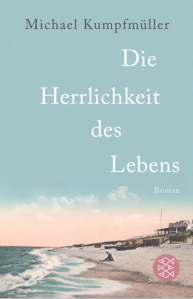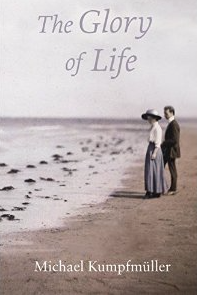

There are two types of historical novels: those which are pure fiction and those in which real people are brought to life. I’m fond of the latter, so I was interested in Michael Kumpfmüller’s Kafka novel Die Herrlichkeit des Lebens - The Glory of Life.
What a sad and moving book this is. The last Kafka book I’ve read was Brief and den Vater – Letter to My Father, and with that in mind, Kumpfmüller’s novel was even more moving. There’s this future giant at of German literature, who, at forty, is still afraid to face his father, to make decisions for himself, and to allow himself to live a happy, fulfilled life. And then, on a holiday with his sister, he meets Dora Diamant, a young Eastern Jewish woman who works as a cook in a holiday home for Jewish children. It’s the year 1923, Kafka has been ill for many years by then and is retired. A year later, in 1924, he will be dead.
Dora Diamant falls in love with him instantly. She loves this sensitive, delicate man. He too, falls in love. She’s good for him and for the first time in his life he makes plans for the future. They want to live together in Berlin. He will not return to his family home in Prague. It takes a lot of courage for him to oppose his parents, but they finally give in. Of course, they don’t know that he will live with Dora.
The months in Berlin are some of the happiest in Kafrka’s life, but they are difficult too. Kafka and Dora are not married and landlords aren’t keen on having them in their house. And there’s the hyperinflation. Money’s devalued constantly. Life in Berlin is incredibly expensive. The winter is harsh and the apartments are cold. It doesn’t take a lot for a frail man like Kafka to fall ill again. This time it will be fatal.
The book tells us how he has to return to Prague, from there to a sanatorium in Austria, and to another one, near Vienna. Dora follows him eventually. Kafka’s parents have accepted her. Possibly they sense it’s the end anyway.
It’s incredibly sad to read how Kafka suffered. How painful it was to write his final short stories, but it’s also interesting to read about some of those stories and what they meant. In his last year, for the first time, he stood up against his father; for the first time he’s almost free. Too late though. He dies in June 1924, after long and intense suffering.
Kumpfmüller alternates between Dora’s and Kafka’s point of view which enlarges the book. The dialog is rendered in indirect speech which is the only way this could have been done. Anything else would have been tacky. Besides, he had to invent most. The notebooks and letters of Kafka’s last years are lost. Dora took them and in 1933 they were confiscated by the Nazis.
I never pictured Kafka to be a ladies’ man nor that there was a true joy of life hidden in him. It’s horrible to see to what extent his father crushed him.
Anyone interested in Kafka should read this. Preferably, in parallel with some of his short stories and The Letter to My Father.
